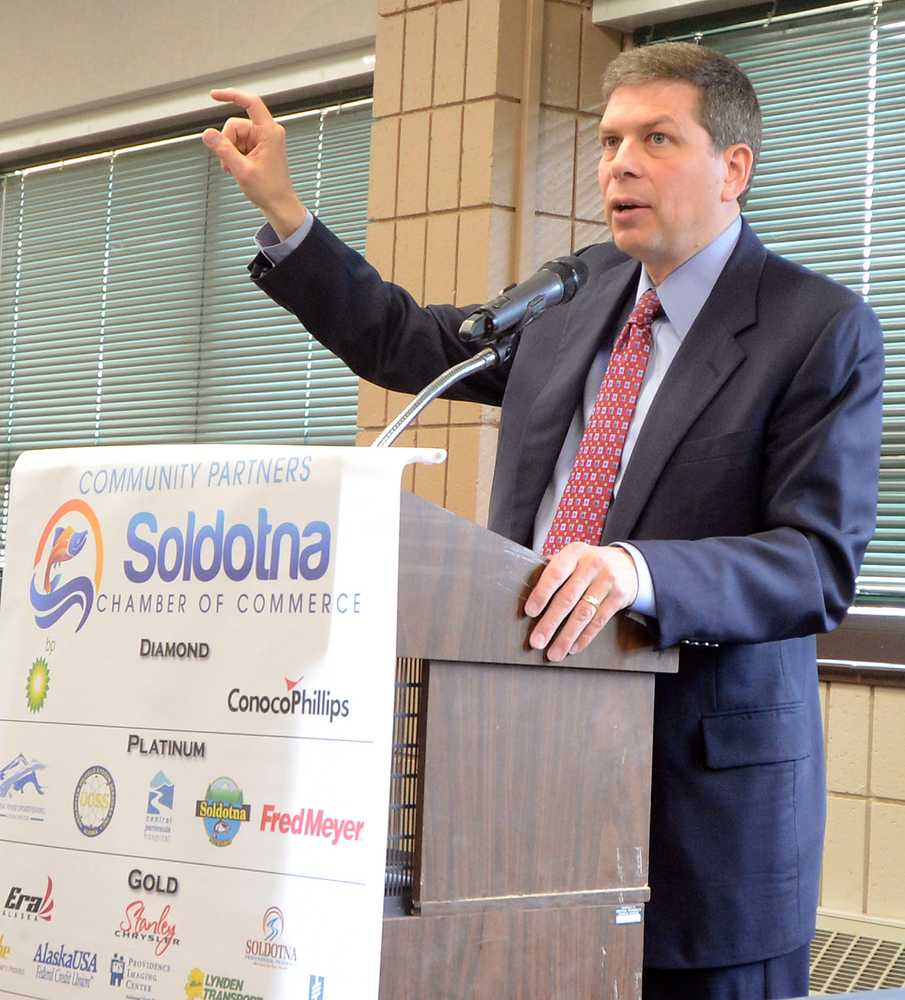Democratic U.S. Senator Mark Begich said he remembers driving through the Kenai Peninsula five years ago, shortly after his election to the U.S. Senate, and noticing the economy here was not in the best of shape.
In a return to the area, he shared some insight into his congressional activities then fielded questions on his tax reform proposal, health care and the future of Alaska’s economy at a joint Soldotna and Kenai Chamber of Commerce luncheon Tuesday at the Soldotna Regional Sports Complex.
Begich said it has been his priority to create more jobs for the benefit of Alaska’s long-term development. He called Monday’s announcement of ConocoPhillips’ permit approval to export liquefied natural gas from its Nikiski plant incredible news considering the effort it took him to push the LNG export permit to the top of the list.
“It means jobs in the community,” he said. “We need to keep pressure on agencies because they get into their systems and get lost.”
Begich said the condition of the state finances are not as healthy as they used to be and the state has a challenge ahead to increase oil production to move forward.
He said his appointment to the appropriations committee is a “powerful opportunity” for Alaska because with Sen. Lisa Murkowski also on the committee, the two can team up on issues that could benefit the state.
Military expenditures for construction in the state rose from $18 million when he first joined the appropriations committee to over $200 million last year. These investments are important to Alaska economy and national defense, he said.
Begich said all the committees he sits on, from veteran’s affairs to commerce, which includes transportation, oceans and fisheries, are all advantageous to Alaska. He has adopted issues of the Arctic by bringing them up in the ocean subcommittee.
“One thing I have learned in the senate as a chair of a committee, if I start talking about an issue nobody else is, you can take over the issue,” he said. “Sure enough now we are doing Arctic stuff which is very important for Alaska because the opportunity is significant.”
Begich was asked what could be done to bring Alaska back to the top of oil production. With North Dakota leading the nation in production, he said things would change with development in the Arctic. He pointed to progress being made in the National Petroleum Reserve-Alaska and an estimated 26 billion barrels of oil on the outer continental chelf. When oil is produced, a 600-mile long pipeline would need to be built to move the resource and would create jobs all over the state, he said.
While speaking on tax day, Begich said he dreaded this time of year. He said filing taxes could be a complicated process and has not been reformed since 1986. The idea for his Income Tax Reform Act of 2011 was to simplify the form down to one-page, reducing six tax rates to three.
When asked about the fair tax, he said he couldn’t support that kind of tax rate on an individual whose principle product is food.
Begich said the tax reform is deficit neutral and has growth potential.
“When I was mayor, 40 percent of my growth in tax revenue was from new business activity,” he said. “Not taking existing people and making them pay more.”
Begich responded to a question on his future outlook on health care and said the Affordable Care Act will continue to be worked on over time. He said he had several fixes with tax incentives that will work for small business owners.
“Small businesses who do not provide health care today but want to because it’s a great detention tool,” he said. “We lose employees to larger companies who offer health care.”
Begich said tourism on the Kenai Peninsula is a big part of the economic equation. In Washington, D.C., people have a difficult time realizing the impact and he described the whole logistics chain involved to demonstrate the trickle-down effect it has on the community.
The fastest growing middle class markets are people from India, China and Brazil, he said, and those countries are being targeted to promote tourism in the U.S.
“We love foreign travelers because they spend more money and stay longer and that’s good business for us,” he said. “Those folks like to come to unique places and there is not place better than Alaska.”
Reach Dan Balmer at daniel.balmer@peninsulaclarion.com.

